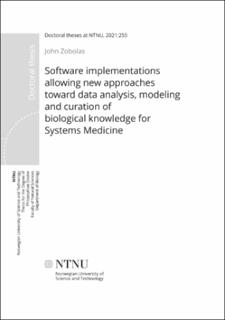Software implementations allowing new approaches toward data analysis, modeling and curation of biological knowledge for Systems Medicine
Doctoral thesis
Permanent lenke
https://hdl.handle.net/11250/2987882Utgivelsesdato
2021Metadata
Vis full innførselSamlinger
- Institutt for biologi [2575]
Sammendrag
Cancer is one of the leading causes of death globally. To combat cancer, scientists want to understand the mechanisms that drive this disease so that effective treatments can be developed. However, regulatory mechanisms of cancer can be very complex, so its analysis has proven to be quite challenging. The field of Systems Medicine has emerged to address this problem, combining expertise from different scientific disciplines such as Biology, Medicine and Computer Sciences. This approach aims to integrate, analyze and interpret data from different resources and produce new knowledge, which is the basis for the development of personalized therapies. The efforts described in this PhD thesis have improved various parts of a systems medicine approach towards cancer therapy development.
We developed software tools that enable a better collection and sharing of biological knowledge described in scientific publications. Our software facilitates the task to search and annotate information about molecules and their interactions and to store it in a format computers can understand. With this knowledge scientists can build networks describing the structure and signaling information of biological systems such as the human cell. These signaling networks can be used to construct computational cancer models, which can explain why signals traveling through these networks get disrupted, leading to disease. We implemented simulation software that automatically builds and optimizes many models to match given cancer signaling data. Our computer models successfully predicted drug combinations that act synergistically in experiments. A new software tool was built to analyze the simulation data and find biological or modeling markers that explain why some drug combinations are beneficial while others are not. Lastly, we proposed a mathematical framework that allows us to optimally set the parameters of our models and make them better match experimental observations and comply with the underlying signaling information.
Består av
Paper 1: Zobolas, John; Touré, Vasundra; Kuiper, Martin; Vercruysse, Steven. UniBioDicts: Unified access to biological dictionaries. Bioinformatics 2020 s. -Paper 2: Zobolas, John; Jin-Dong, Kim; Kuiper, Martin; Vercruysse, Steven. Linking PubDictionaries with UniBioDicts to support Community Curation. BioHackrXiv. December 25. 2020.
Paper 3: Flobak, Åsmund; Zobolas, John; Vazquez, Miguel; Steigedal, Tonje; Thommesen, Liv; Grislingås Asle; Niederdorfer, Barbara; Folkesson, Evelina; Kuiper, Martin. Fine tuning a logical model of cancer cells to predict drug synergies: combining manual curation and automated parameterization
Paper 4: Zobolas, John; Kuiper, Martin; Flobak, Åsmund. emba: R package for analysis and visualization of biomarkers in boolean model ensembles. Journal of Open Source Software (JOSS) 2020 ;Volum 5.(53)
Paper 5: Zobolas, John; Monteiro, Pedro T.; Kuiper, Martin; Flobak, Åsmund. Boolean function metrics can assist modelers to check and choose logical rules, Journal of Theoretical Biology, Volume 538, 2022,
